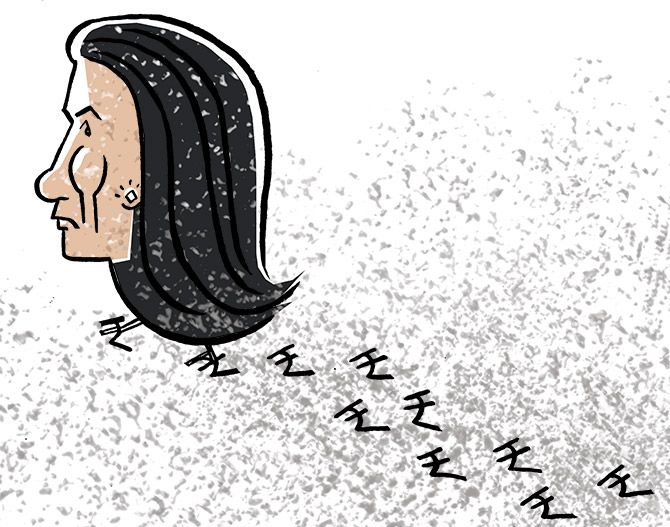'Banking is a boring business but still the banker should enjoy it as fancy awards and cozy relationships with politicians, Bollywood stars and corporate honchos cannot save them if the job is not done properly.'
In the concluding part of the series Tamal Bandyopadhyay wonders how long Kochhar would need to wait for her redemption or downfall and atonement.
Part 1: EXPLAINED! How Kochhargate unfolded
Illustration: Dominic Xavier/Rediff.com

Allowing the Srikrishna panel to have as much time as it wants to complete the probe was a masterstroke by the board.
By doing this, it forced Kochhar to put in her papers.
How? India’s banking law does not allow the boss of a bank to abstain from office for four months or more.
Kochhar, who went on her annual leave in June 2018 and later had to stay away for the completion of the probe, had no choice but to quit as the probe took its own time.
It was a sort of bloodless coup which thwarted any ambition harboured by her to come back to the bank as CEO.
A few days before the board sacked her, the Central Bureau of Investigation had filed its first information report alleging criminal conspiracy, cheating and quid pro quo -- ICICI Bank sanctioning Rs 3,250 crore to Dhoot’s group companies and Dhoot, in turn, investing Rs 64 crore in Deepak’s NuPower Renewables Ltd.
Going by the FIR, the bank sanctioned six high-value loans to the Videocon group between June 2009 and October 2011, violating the norms of loan sanction and Kochhar was one of the members of the sanctioning committee.
The FIR also named other senior bankers who were directors on the board of ICICI Bank then, including Kamath, current CEO Sandeep Bakhshi, Sonjoy Chatterjee, K Ramkumar, NS Kannan, Zarin Daruwala, Rajiv Sabharwal and independent director Homi Khusrokhan.
While Kamath is the president of the New Development Bank of BRICS countries, others are prominent names in Indian finance, heading foreign and local banks and non-banking finance companies.
Of course, the CBI will have to probe these allegations - something which the country’s premier investigative agency is not good at, particularly when it comes to the banking sector.
Both Arun Jaitley and Piyush Goyal have come down heavily on CBI’s “investigative adventurism”.
What’s the Kochhar side of the story?
Well, barring issuing a release, expressing her shock, she has been keeping mum.
She has appointed a lawyer to deal with the cases with the market regulator and other agencies but not the bank.
Those who know her well are wondering why would the Videocon group do a favour to Kochhar’s husband as a quid pro quo to get money from the bank when it was getting money from the entire banking industry on a platter?
They also claim that Kochhar all along made the statutory disclosures about her husband’s companies but she did not disclose Videocon’s investments as she was not aware of them.
Finally, they say that a particular corporate house has been after Kochhar’s blood because she has stopped giving it fresh loans and has been hounding it to recover money already lent to it.
How would she recuse herself from the credit committee when she was not aware of her husband’s dealings, they are asking, pointing out that out of the six loans, mentioned in CBI’s FIR, she was involved in sanctioning only two.
Finally, Dhoot’s Rs 64 crore investment in her husband’s company is not gratification for her; it’s an investment by Dhoot which he can liquidate after 2021.
But her bank is not taking these arguments seriously.
For it, Kochhar is a closed chapter.
Even before the Srikrishna report was submitted, the bank wrote to the Securities and Exchange Board of India, requesting it to “decouple” the bank from Kochhar’s case.
For her, it will be a lone battle and the outcome will depend on how Sebi, the CBI, income tax authorities and the Enforcement Directorate move.
Kochhar’s fall from the grace has dealt a blow to the personality cult which the Indian banking sector is known for -- in many cases the CEOs don a larger-than-the-institution persona.
Many saw the seeds of Kochhar’s downfall in November 2014 when Shah Rukh Khan danced at the sangeet ceremony of her daughter’s wedding in a Mumbai hotel.
I don’t know whether he performed there or was a guest like many others, including Amitabh Bachchan, and chose to shake a leg well past midnight but it got wide media publicity which would not have been possible if the Kochhars did not want that.
At the 60th anniversary of the ICICI group in January 2015, she shared the stage with Prime Minister Narendra Modi who graced the occasion to dedicate to the nation the first digital village adopted by the bank -- Akodara in Gujarat.
But when it came to the crux, brushing shoulders with the high and mighty and the penchant for glitz and glamour didn’t come to her aid.
In sync with the feudal style that she adopted after moving to the corner office, Kochhar never had to wait for the lift at the bank’s headquarters as someone would always be there to press the button and hold the lift when her high-end car entered the premises.
She could always say that was a legacy but the rest is not.
We don’t know how long she would need to wait for her redemption or downfall and atonement.
What are the lessons from Kochhargate?
- The boards of all private banks are not necessarily efficient and independent. The directors, including the chairman, could be a handmaiden of the CEO. First, rushing to give Kochhar a clean chit and later making a volte-face expose the quality of the board of ICICI Bank.
- All along, the Reserve Bank of India has been maintaining a stony silence. Shouldn’t the banking regulator take a re-look at its perceived “hands off” approach for a systemically important entity such as the ICICI Bank?
- Does the larger than life image of a CEO in a company (not necessarily only banks) sow seeds of mis-governance, particularly when the leaders’ tenure is long? Should there be a cap on the tenure of the CEO?
- Does this case send a clear message to eminent persons not to defend in public media a high profile professional accused of misconduct without possessing all the facts?
- Finally, the recent developments in a few private banks, including ICICI Bank, say that the days of personality cult in Indian banking are over. The bankers should spend more time on bringing down the cost of funds, pushing up the quality of assets and governance. Yes, banking is a boring business but still the banker should enjoy it as fancy awards and cozy relationships with politicians, Bollywood stars and corporate honchos cannot save them if the job is not done properly.
Tamal Bandyopadhyay, a consulting editor with Business Standard, is an author and senior adviser to Jana Small Finance Bank Ltd.










